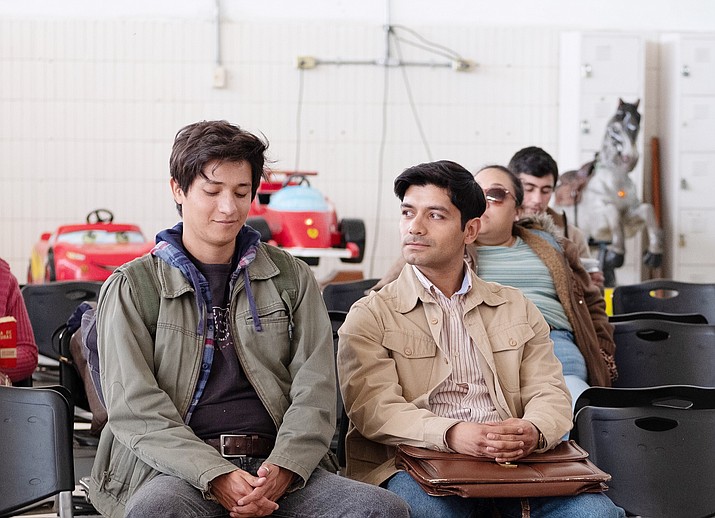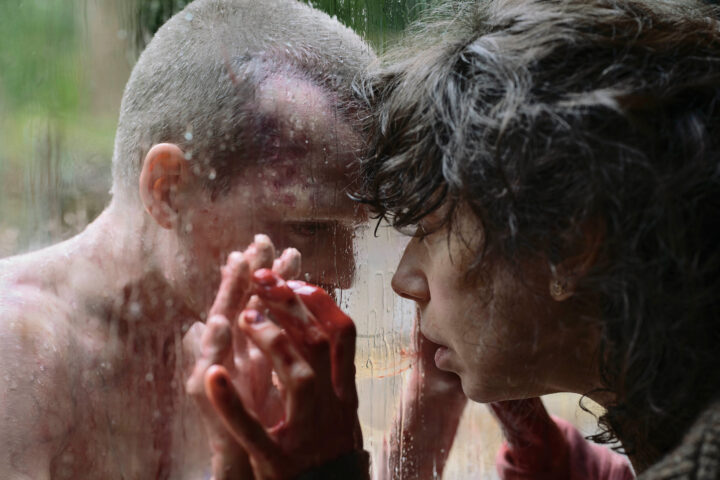Documentarian Heidi Ewing’s astonishing narrative debut I Carry You With Me, as thematically ambitious and fully realized a film as we will see this year, is an artistic and emotional knockout love story, transcending decades and demarcations, told with poignant empathy. Ewing, whose 2006 Jesus Camp was Oscar-nominated, is well-regarded for her observant docs and initially conceived of this picture as the same before settling on an approach incorporating narrative past events and docu-current reality.
The picture’s opener is set in colonial Puebla, Mexico, and the gritty byways and environs—a steamy restaurant kitchen, cramped apartment, darkened alley convenience store—lend immediate authenticity to the atmospheric milieu. Our entry point to this world is young Ivan (Armando Espitia), a poor dishwasher with dreams of becoming a chef and with a young son who lives with his ex-girlfriend, Paola (Michelle Gonzalez).
Ivan is a recessive, soft-spoken type, so when he is invited to a gay bar by best friend Sandra (Michelle Rodriguez), he’s tentative about an immediate attraction with charismatic Gerardo (Christian Vazquez), a teaching assistant at a local college and from a more successful family that owns a large ranch and cattle herd.
Both young men have troubled histories with their fathers, evidenced in pointed flashbacks, and neither can embrace his identity—Ivan stands to lose his son should Paola discover their secret, and Gerardo, more comfortable with his identity, has a macho rancher father who will never accept him.
Yet theirs is love at nearly first sight, a passion Ewing movingly explores in scenes of subtle tenderness; Espitia and Vazquez are affecting as they navigate personal, family and economic identities, all of which factor into their discussions and will shape their futures.
One of many obstacles is the economic and social schism; struggling Ivan refuses Gerardo’s help with rent and is determined to transcend his meager job doing “woman’s work” as Gerado’s father chides him, and to become a chef. This dream is thwarted several times and after a harrowing emigration to Manhattan and an elating scene where Ivan unexpectedly gets his shot, the picture, and Ivan’s future, shifts into a different gear.
In the second half, Ewing trains her lens on the real-life men today, living as successful restaurant proprietors in Brooklyn, in skillfully captured video footage. It’s both heartening and heartbreaking—while their love has stood the test of time, it has also separated them from family, and for Ivan, unable to attend his father’s funeral in Mexico or visit his son after more than twenty years, the Draconian lack of immigration policy has created a dynamic where as free and successful as the men have become, they are just as trapped. This irony produces haunting, voice over ruminations about memory and loss.
As a love story and immigrant saga, I Carry You With Me is primarily about dreams—those to make something out of one’s future and those that haunt daydreams with nostalgia and regret. The lovers’ quagmire—that the realization of dreams America comes at a price—the inability to go back across the border lest they not be able to return—yields heartrending moments of reflection on what’s been lost.
Ewing smartly stands back and observes her real-life Ivan and Gerardo—their private contemplations, public successes, decades-long tenderness, internal monologues—juxtaposing life in contemporary New York with their younger years in Puebla as boys, young men and adults. The result is a rushing amalgam of memory and incident where past and present coexist with success and disappointment, happiness and despair. There’s a gritty romanticism to their youthful courtship and a hard-won realism to their later life successes.
Special mention goes to young stars Yael Tadeo and Nery Arredondo as the men’s childhood surrogates, who in moments of awakening—joyous as when adolescent Ivan tries on a quinceañera dress sewn by his seamstress mother, and brutal as Gerardo is dragged out of bed to a field and tormented by his father—suggest a cultural, adolescent suppression which must be fled.
Ewing has crafted a sprawling, hypnotic, deeply involving film. It’s a love story, a cultural examination of Mexican mores and families (class, father figures, gritty everyday milieus not seen in American movies) and of the harsh realities of the U.S. for undocumented immigrants. It is a true story facing down the social and economic barriers to fulfilling personal and professional potentials in both countries. It is a swooning love story tested by the unavoidable sacrifices required by the American Dream (which “happens in slow motion” and can leave poignant wreckage). It is a real epic that stretches across decades and borders and genuinely makes you feel the weight of having lived, over years, with its striving, beleaguered couple. The young Mexican actors, Espitia and Vazquez, play every note of palpable passion and simpatico dependency required to navigate hardships in, and bear the longing for, both worlds.
I Carry You With Me, a sprawling epic, is the year’s best film to date.
4 stars.



